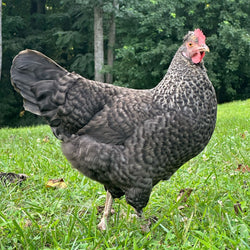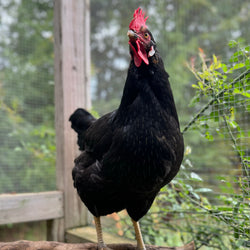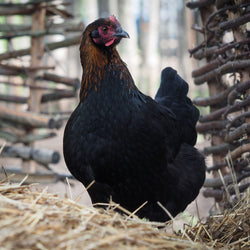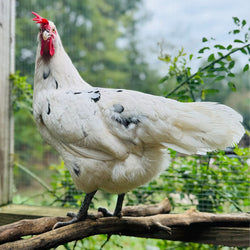f=menu&page=11/--
Frequently Asked Questions
Here we answer the most commonly-asked questions about ordering, chicken care, and more.
What is regular chicken body temperature?
Chickens have a much higher body temperature than humans do. Normal chicken body temperature ranges from about 105 to 107 degrees Fahrenheit. Just as with humans, it can vary a little depending on time of day, wither the chicken is stressed, or whether she's eaten recently. Only take the temperature of adult chickens, not baby chicks. If your chicken seems ill and you want to check her temperature, you can do it by yourself, but it's really much easier with assistance: one person can hold your hen still, while the other can use the thermometer. Please get assistance if possible....
Read MoreWhat is the difference between different types of chicken feeds like starter, grower, finisher, layer, and developer?
Starter, grower, finisher, layer, and developer are all considered "complete feeds" to offer your chickens, but they come in different varieties,depending on your chicken's current needs. In other words, it's a lot like purchasing dog food for your dog or cat food for your cat. You may start your new pup on puppy feed, then move to an adult feed, and years later give him a feed designed for senior dogs. With a cat, you may start with kitten feed, and from there go to adult feed, or even hairball formulas. You might get grain free--or you might find they...
Read MoreWhat is a wormer?
A "wormer" is a medication used to help rid your chickens of infestations of internal parasites like round worms or other worms, the same way you might use a wormer for your dogs or cats. However, if you are eating your chickens' eggs - and medications can be transmitted through the eggs - there are only certain types of wormers that should be used, and you may have an "egg discard" period, where you have to throw away any eggs laid (so you're not getting low doses of wormer, too!). Some wormers do not have a discard or "withdrawal" period...
Read MoreAll about Virulent Newcastle Disease
Virulent Newcastle Disease (VND) is no joke. It is easily spread among birds (wild and domestic), and once it is contracted, even birds that survive continue to be carriers of the virus, endangering all the birds around them. Because of this, VND is a reportable disease for which euthanasia is recommended. Read on to find out more: Virulent Newcastle Also called Pseudo-plague, Asiatic Newcastle, VVND, NVND, VND, Velogenic Newcastle, VN, Pneumoencephalitis, formerly called Exotic Newcastle Prevalence Rare Signs General signs Sudden death with no prior symptoms, or respiratory signs with a neurological component, including paralysis or partial paralysis of limbs,...
Read MoreAll about Domestic Newcastle disease
Domestic Newcastle Also called Newcastle Disease, Avian Distemper, Pseudofowl, ND, Parainfluenza, Fake Flu Prevalence Common Signs General signs - Coughing, sneezing, wheezing, lack of appetite, lethargy, huddling near heat source and fluffed-up down. Mucousy nares (nostrils). Occasionally layers exhibit a drop in laying and misshapen eggs. Some birds show signs of neurological disorders about two weeks after the respiratory illness. Mortality is low in backyard flocks with an owner who can isolate a bird until recovery. In large commercial flocks without close supervision, birds showing neurological symptoms can get picked to death. Cardinal or diagnostic signs - Lab ID, or...
Read MoreAll about Avian Infectious Bronchitis disease
Avian Infectious Bronchitis is a respiratory illness that results in death in about 5% of the birds that contract it, and may cause a permanent reduction in laying or reduce the quality of eggs in hens that survive it. As with all avian diseases, practicing good biosecurity will go a long way toward protecting your birds from this virus. Read on to find out more. Avian Infectious Bronchitis Also called IB, IBV, Infectious Bronchitis, Cold Prevalence Common Signs General signs Coughing, sneezing, lack of appetite, lethargy, huddling near heat source and fluffed up down. Mucousy eyes or nares (nostrils). Thirst...
Read MoreWhat is NPIP and why should I purchase only from NPIP breeders?
NPIP stands for National Poultry Improvement Plan, and it's a voluntary certification system that poultry breeders and hatcheries can participate in. (Our hatchery and all breeders associated with My Pet Chicken are NPIP certified.) Essentially, NPIP certification means you submit the birds in your breeding flock to regularly scheduled testing to assure they are Pullorum-Typhoid-free. While NPIP participation is voluntary, typically states have certification or monitoring requirements if you want to ship birds into that state, so large hatcheries all participate. (At the time of this writing, we don't know of a major hatchery that isn't NPIP certified.) Pullorum and...
Read MoreWhat is a lash egg?
A lash egg is less of an egg than it is a roughly egg- or sausage-shaped exudate, consisting of thickened pus and other materials. It is probably the grossest egg your hen will ever lay, and will often look like cheesy, bloody strata or other matter arranged in strappy, skin-like layers. You may think she's expelled an internal organ. Ew. Seriously. If your hen lays a lash egg, it means she is sick with salpingitis, which is an infection of the oviduct. Please take her to a veterinarian immediately.
Read More







"The Clubhouse" Coop
Easy to assemble and built to last, the Clubhouse Coop is the perfect starter coop for a small flock.











